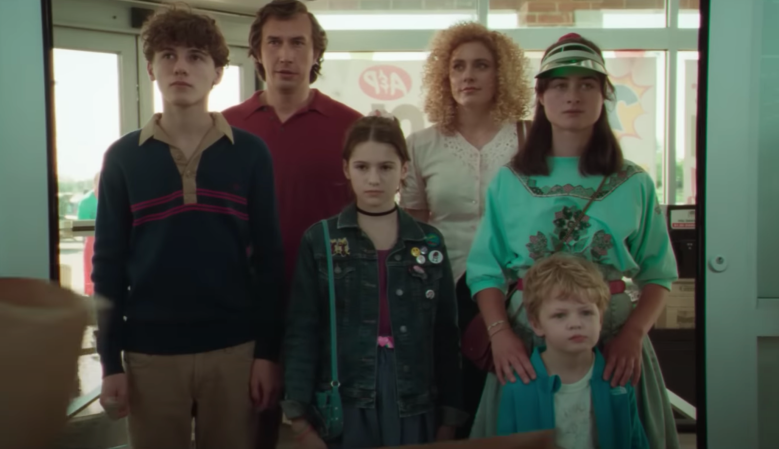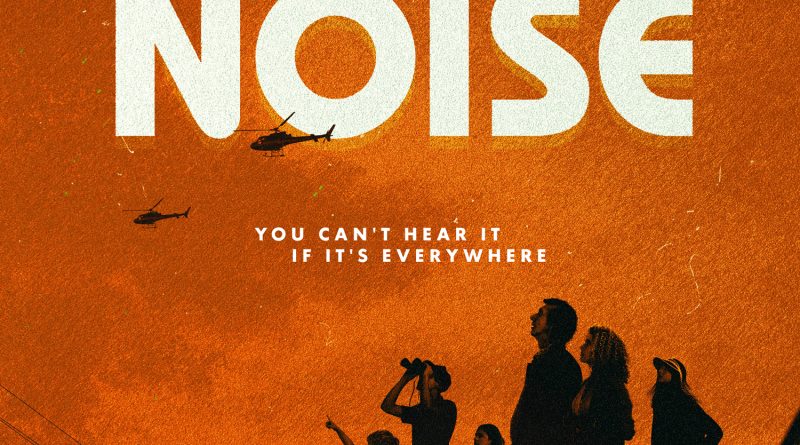Friday Film: White Noise – LFF 2022
This review was first written for another outlet, after I saw the film at Venice 2022
Director: Noah Baumbach
Cast: Adam Driver, Greta Gerwig, Don Cheadle, Jodie Turner-Smith
Netflix
On paper White Noise has something for everyone. There’s spectacular footage of car crashes in various movies, the enchanting Greta Gerwig, smart ass teenagers questioning the world and its values, apocalyptic danger, recognisable, everyday family life, erudite explorations of timely issues such as how we get and consume information, how easily we can succumb to authoritarianism if it’s sold to us as protection of our health, the ways in which we avoid and try to stave off death, why we look to others to know what is dangerous. There’s even footage of Elvis Presley! But, unlike the Elvis movie, people won’t be going to the cinema see this 23 times + times or crying over it.
This is not a film that engages the heart. It’s the cinematic equivalent of a well written, terribly clever, text book you read in preparation for a tough exam and never touch again. Or helpful research you use as the basis for an essay that will gain you solid marks and a B + commendation from your teachers for producing ‘lucid and thought provoking’ work. In short, it’s a film to be admired not loved. It’s also the sort of movie that you can watch and acknowledge the impeccable film making behind it, the committed performances from the cast, the carefully constructed script but just not care for.
Based on the 1985 novel by Don Delillo, White Noise is a far more ambitious film than director Noah Baumbach’s last effort, the popular 2019 drama Marriage Story. His influences such as the American disaster movies of the 70s and 80s, the rom-coms of that era, the family on vacation movies, as well as the high octane thrillers of directors such as BrianDe Palma, are all evident here in the tonal shifts, the technically assured and stylish look of the film, the flashy action scenes, the looming disaster of a toxic, chemical cloud, the large family bundled into a car and the verbal back and forth of the central married couple.
As in Marriage Story, Adam Driver is the leading man, albeit, older here, with a receding hairline and potbelly. He is Jack Gladney, a lecturer in Hitler studies at a fictional college in a mid western town. He’s married to Babette (Greta Gerwig, the real life Mrs Baumbach) who has ‘important’ hair, according to the film. For the record, it’s a curly wig which makes her look a little like Bernadette Peters.
The couple have a blended family with children from several previous relationships, plus a small boy who is of the marriage. On the surface they have a busy, noisy, slightly chaotic household that, nevertheless, ticks along nicely. But Babette has a secret stash of tablets called Dylar which she pops into her mouth daily when she thinks no one is looking and has started to forget things which raises the spectre of early onset dementia. The couple’s pillow talk is about death, their fear of it and how each hopes they will die first because they can’t imagine a life without the other. The precocious teenage children have a never ending supply of questions and challenges for their parents about how and why the world turns in an era before Google. And an apocalyptic, poisonous, chemical dark cloud is forming, literally, above their heads (caused by a truck transporting gasoline crashing into a train transporting volatile toxic waste)which will lead to the family and the local population having to evacuate their homes, wear masks and go into a form of quarantine.

As I say, an interesting mish mash of concepts overlies the mundanities of everyday family life shown at some length.
How does Elvis fit into all this?
Through professor Murray Siskind(Don Cheadle), a fellow lecturer at the college Gladney teaches at. Murray wants Elvis to be studied in the same way that Hitler is. In difficult times people turn to epic men and as Murray tells Gladney, ‘Elvis is my Hitler.’ The sequence in which both men play to the gallery with an analysis of their respective subjects to a lecture hall of students is an entertaining, provocative and compelling one, even though it’s offered as a sly satire on how much academia likes to imbibe popular culture.
Ultimately though, while White Noise, boasts both style and substance, it is too much of a compilation of ideas to work as a cohesive, enjoyable film. The characters often veer towards the insufferable, the dialogue is too literary to work (as in, no one talks like that in real life),the satire is never funny enough and none of the ‘big ideas’ amount to much or reach any sort of conclusion.
3/5

